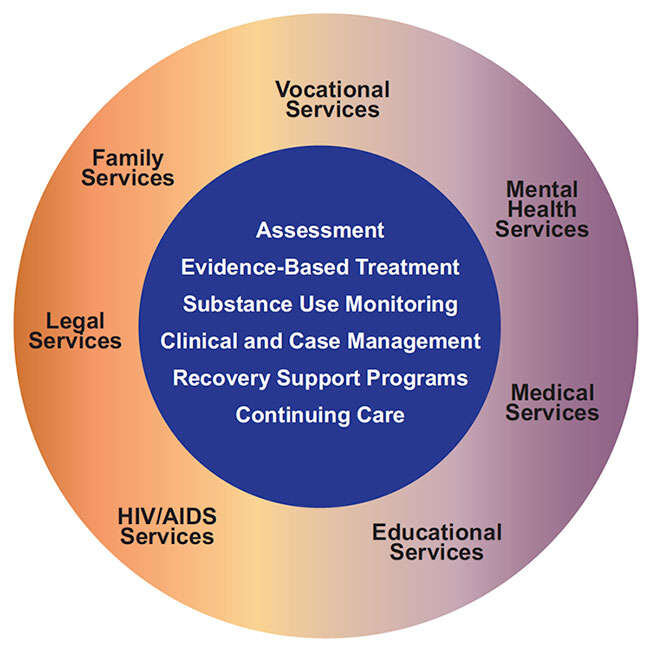Comprehensive Guide to Chemical Abuse Treatment: Comprehending, Techniques, and Enduring Recovery
Substance Abuse refers to the harmful or dangerous usage of copyright materials, consisting of alcohol and immoral drugs. It is not merely a matter of willpower or bad decision-making-- it's a complicated problem affected by organic, emotional, and social elements. Individuals having problem with drug abuse often experience uncontrollable drug-seeking habits in spite of unfavorable repercussions in their personal, professional, and social lives. Over time, these substances can alter brain feature, harm judgment, and create physical and mental dependence. Recognizing the nature of Substance Abuse is the first step towards resolving it effectively.
The root causes of Substance Abuse are diverse. Genes, psychological wellness conditions, ecological pressures, injury, and direct exposure to materials at a very early age can all add to the advancement of dependency. It is often interlinked with problems such as anxiety, anxiety, or post-traumatic stress and anxiety condition (PTSD) For numerous people, medications and alcohol become coping systems-- tools to get away emotional discomfort or stress and anxiety. Nonetheless, this short-lived alleviation quickly paves the way to long-term consequences, as tolerance develops and the person requires even more of the Substance to attain the very same impact.
Acknowledging the indicators important Abuse early on can stop the problem from escalating. Common indication consist of adjustments in habits, neglect of obligations, withdrawal from loved ones, monetary troubles, and physical signs and symptoms such as weight reduction, tiredness, or inadequate health. When left neglected, chemical abuse can bring about severe health and wellness problems, harmed partnerships, and also premature death. Early treatment and accessibility to therapy are important for individuals struggling with addiction.
The Importance of Looking For Chemical Abuse Treatment
Looking for specialist therapy for drug abuse is one of one of the most crucial decisions a person can create their wellness and future - dual diagnosis rehab NJ. Dependency is not something that can be gotten over by self-control alone-- it calls for organized intervention, guidance, and regular assistance. Therapy programs are developed to deal with both the physical dependence and the underlying mental or emotional issues that drive habit forming actions. Without therapy, the cycle of regression and self-destruction commonly continues, putting the individual's life and health in jeopardy
The value of expert treatment depends on its ability to supply a risk-free and controlled setting for healing. Throughout detoxing, clinical specialists help people take care of withdrawal signs and symptoms that can be potentially life-threatening and painful. After therapy, therapy and detoxification sessions enable people to face the origin of their addiction, create coping abilities, and reconstruct their sense of self-worth. Treatment likewise helps re-establish healthy and balanced routines, framework, and accountability-- every one of which are important for long-term healing.
Beyond the physical and psychological facets, drug abuse treatment plays a considerable function in recovering connections and social performance. Dependency often brings about damaged count on, seclusion, and strained family characteristics. With family treatment and team sessions, individuals can restore interaction and reconnect with loved ones. By entailing family participants in the healing process, treatment programs enhance the support network needed for keeping soberness. Fundamentally, looking for therapy is not almost quitting drugs or alcohol-- it's about recovering one's life and producing a structure for a much healthier, extra meeting future.
Sorts Of Chemical Abuse Therapy Programs
There is no one-size-fits-all technique to treating addiction. Each person's trip is distinct, and so are their therapy requires. Drug abuse therapy programs can be classified into numerous kinds, ranging from inpatient rehabilitation to outpatient therapy and alternative care. The selection of treatment depends on variables such as the intensity of addiction, the presence of co-occurring psychological health and wellness problems, and the individual's lifestyle and assistance system.
Inpatient or Residential Treatment supplies a highly organized environment where individuals live in a therapy center for a certain period, usually in between 30 and 90 days. This type of program uses day-and-night clinical supervision and intensive treatment sessions. It's suitable for individuals with serious dependencies or those who have actually relapsed several times. Inpatient care eliminates the person from day-to-day triggers and temptations, allowing them to focus solely on healing. Treatments may consist of cognitive-behavioral treatment (CBT), dialectical behavior modification (DBT), and team therapy, all aimed at assisting people understand and manage their dependency.
Outpatient Therapy Programs offer more adaptability, allowing individuals to proceed with their everyday responsibilities while going to set up treatment sessions. This strategy is frequently suitable for individuals with moderate to modest dependencies or as a step-down phase after finishing inpatient rehabilitation. Outpatient programs stress liability and long-term relapse avoidance strategies. They may include private therapy, medication-assisted therapy (FLOOR COVERING), and support system such as Narcotics Anonymous (NA) or Alcoholics Anonymous (AA)
In enhancement to these, all natural and alternative treatments are coming to be increasingly popular. These programs attend to the body, spirit, and mind link by incorporating practices such as yoga exercise, meditation, art therapy, and nutritional counseling. Several facilities also provide dual-diagnosis therapy for those dealing with both dependency and mental health and wellness conditions. This detailed technique makes sure that the person receives well-rounded treatment that advertises healing on several levels.
The Benefits of Substance Abuse Treatment
The benefits of undergoing drug abuse treatment prolong much past avoiding drugs or alcohol. Among one of the most prompt benefits is improved physical health. Lasting chemical abuse takes a toll on the body, impacting crucial organs such as the liver, heart, and brain. Through detoxing and healthcare, the body starts to fix itself, causing better energy levels, improved rest, and a stronger immune system. Nourishment and physical fitness programs within rehabilitation centers better improve physical recuperation.
Psychological and emotional wellness advantages are just as substantial. Dependency usually conceals underlying mental problems that need to be resolved. find out here During treatment, patients access to certified therapists and counselors that assist them browse sensations of guilt, trauma, or pity. By creating psychological awareness and strength, people learn much healthier means to manage stress and triggers. Cognitive-behavioral therapy (CBT) and other evidence-based approaches encourage clients to transform adverse idea patterns that contribute to regression.

Evidence-Based Approaches in Modern Addiction Therapy
Today's Substance Abuse therapy techniques are based in scientific study and medical practice. Evidence-based treatments guarantee that people obtain interventions shown to be efficient. One of the most extensively used techniques is Cognitive-Behavioral Treatment (CBT), which helps clients transform and identify assumed patterns that lead to Substance usage. By comprehending the connection in between thoughts, emotions, and habits, individuals can find out to deal with triggers in healthier ways - dual diagnosis rehab NJ. CBT is typically integrated with various other treatments to attend to co-occurring problems such as anxiety or stress and anxiety
Another efficient technique is Medication-Assisted Treatment (FLOOR COVERING), especially for opioid and alcohol dependency. Floor covering uses FDA-approved drugs such as buprenorphine, methadone, or naltrexone to minimize food cravings and withdrawal signs and symptoms. When incorporated with counseling and behavioral treatment, floor covering considerably enhances therapy retention and lowers relapse rates. It enables people to support their lives while concentrating on emotional recovery and restoring connections.
Team and family members treatment are likewise essential parts of evidence-based therapy. Team sessions develop an area for individuals to share their stories and acquire insights from others in recovery. Family members treatment, on the other hand, addresses the relational damages created by addiction. It assists enjoyed ones understand the nature of the condition and equips them with tools to provide support while setting healthy limits. These cumulative healing approaches strengthen the healing procedure and advertise long-lasting recovery.
Constructing a Life After Treatment: Maintaining Long-Term Recovery
Recovery does not finish after finishing a therapy program-- it's a lifelong trip that requires commitment, discipline, and continuous support. Transitioning back to day-to-day life can be challenging, as individuals are faced with triggers, stressors, and obligations that can test their soberness. This is where aftercare programs play a crucial function. Aftercare may consist of recurring treatment, peer support system, sober living setups, and relapse prevention preparation. The goal is to help individuals preserve the development they have actually made and stay clear of slipping back into old patterns.
Developing a new way of living fixated health and function is crucial for lasting success. Several people find fulfillment by seeking leisure activities, fitness routines, education, or volunteer work. Building an organized day-to-day regimen aids prevent boredom-- an usual trigger for regression. Reconnecting with family members, fixing connections, and surrounding oneself with positive impacts further reinforces a healthy lifestyle. It's also vital to recognize that problems can happen, however they do not specify the person's journey. What issues most is the readiness to seek assistance and proceed progressing.
Inevitably, continual recuperation is concerning improvement-- physically, mentally, and mentally. It includes redefining one's identity and searching for significance beyond addiction. Individuals that devote to long-lasting recovery commonly come to be advocates, advisors, or support figures for others dealing with drug abuse. Their stories of resilience act as powerful pointers that recovery is feasible. With the ideal treatment, assistance, and state of mind, anybody can conquer addiction and construct a satisfying, substance-free life.
Verdict: A Path Toward Recovery and Hope

Seeking check it out expert treatment for Substance Visit Your URL Abuse is one of the most crucial decisions an individual can make for their health and future. Beyond the physical and emotional facets, Substance Abuse therapy plays a substantial role in restoring connections and social performance. Substance Abuse therapy programs can be categorized into several types, varying from inpatient recovery to outpatient counseling and holistic care. Inpatient or Residential Treatment gives a highly structured atmosphere where people live in a treatment center for a certain period, normally between 30 and 90 days. The benefits of undertaking Substance Abuse treatment expand far beyond staying away from drugs or alcohol.